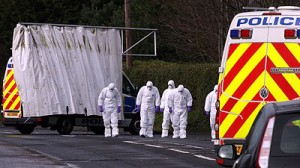
Il metodo di test del DNA non è stato valutato nel Regno Unito o negli Stati Uniti e non è affidabile e selettivo, hanno spiegato gli avvocati della difesa.
L’accusa sostiene che i campioni collegherebbero Colin Duffy e Brian Shivers all’attacco contro i genieri Mark Quinsey e Patrick Azimkar avvenuto all’esterno della base militare di Antrim. La corte sta ascoltando i contributi legali prima di giudicare l’ammissibilità delle prove scientifiche avanzate dall’esperto statunitense Dottor Mark Perlin.
L’avvocato Patrick O’Connor, che rappresenta Shivers, ha detto in aula: “Il dottore è partigiano e non ha la dovuta imparzialità in relazione ai meriti e ai limiti del suo sistema e questa è una violazione dei suoi doveri. Ha dimostrato sdegno e disprezzo anche per le persone illustri che non seguono i suoi metodi ed ecco perché affermiamo si tratti di un uomo con una missione che ha perso la sua obiettività”.
Quinsey, 23 anni, e Azimkar, 21 anni, sono stati uccisi dalla Real IRA mentre ritiravano la pizza all’esterno di Massereene Barracks, ad Antrim, nel marzo 2009.
Duffy, 44 anni di Lurgan, e Shivers, 46 anni di Magherafelt, negano le due accuse di omicidio e i sei capi di imputazione per tentato omicidio – tre soldati, due fattorini ed una guardia di sicurezza.
Il sistema informatico di del Dr. Perlin ha legato i due uomini alla macchina usata per la fuga dopo l’attacco. Ma il metodo accademico dei “veri alleli” di analizzare campioni genetici misti per ottenere un rapporto di verosomiglianza non è mai stato ammesso come prova in un tribunale britannico o irlandese, ma solo in poche occasioni negli Stati Uniti.
Barry MacDonald, che rappresenta Colin Duffy, ha affermato presso il tribunale di Antrim: “La validazione di nuovi metodi e processi scientifici dovrebbe essere presa in considerazione solo se vengono accettati dalla comunità scientifica. Questo non è avvenuto nel caso in specie”.
O’Connor ha aggiunto: “Questo è un uomo che non perde l’opportunità di sostenere ciò che egli vede come un importante contributo al mondo della scienza ed è in missione per promuoverlo”.
L’Istituto Nazionale per la Scienza e la Tecnologia negli Stati Uniti sta valutando i suoi metodi.
DNA testing method ‘unreliable’
The method of testing DNA has not been assessed in the UK or United States and is unreliable and selective, defence lawyers said.
The prosecution claims the samples allegedly connect Colin Duffy and Brian Shivers to the gun attack on Sappers Mark Quinsey and Patrick Azimkar outside their army base in Antrim. The court is hearing legal submissions before judge Mr Justice Anthony Hart rules on the admissibility of the forensic evidence of US expert Dr Mark Perlin.
Patrick O’Connor QC, who represents Shivers, told Antrim Crown Court: “He is partisan and lacks all impartiality in relation to the merits and the limits of his system and that is a violation of his duty. He has demonstrated disdain and contempt for even the most eminent of those who do not follow his methods and that is why we suggest he is a man on a mission who has lost his objectivity.”
Sappers Quinsey, 23, and Azimkar, 21, were shot dead by the Real IRA as they collected pizzas with comrades outside Massereene Army base in Antrim town in March 2009.
Duffy, 44, from Forest Glade in Lurgan, Co Armagh, and Shivers, 46, from Sperrin Mews, in Magherafelt, Co Londonderry, deny two charges of murder and the attempted murder of six others – three soldiers, two pizza delivery drivers and a security guard.
Dr Perlin’s forensic computer-based system strongly linked the two men to the getaway car used in the attack. But the academic’s “true allele” method of analysing mixed genetic samples and deriving a likelihood ratio is relatively new and has never once been admitted as evidence in a UK or Irish court, and only on a few occasions in the United States.
Barry MacDonald QC, who represents Duffy, told the court: “The validation of new scientific methods and processes should only be regarded as having been achieved if they are accepted by the wider scientific community. That has not happened in the present case.”
Mr O’Connor QC added: “This is a man who will (turn down) no opportunity to support what he sees as a major contribution to the world of science and he is on a mission to promote it.”
The National Institute for Science and Technology in the US is assessing his methods.